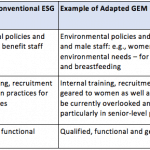Applying a Gender Lens to Agribusiness: A Pathway to Economic Empowerment for Women
The road to equal opportunity for women farmers, workers and entrepreneurs remains a long one — particularly in emerging markets. Women face a multitude of gender-specific challenges when they attempt to participate in and receive equal benefits from supply chains, employment opportunities and distribution networks. For example, while women provide nearly half of agricultural labor around the world, they are significantly underrepresented in more formalized commercial relationships, such as in high-value commercial farming. A study of contract fruit and vegetable farming in Kenya, for instance, found that women smallholders held fewer than 10% of sales contracts.
Agribusinesses can be an important part of the solution to these challenges. These businesses are well-positioned to create greater opportunities for women, due in part to their central role in agricultural supply chains — which generate more than half of employment in many economies across the Global South. Supporting these firms’ efforts to identify practices that improve the gender inclusivity of their sourcing, operations and distribution while delivering positive business impact can help turn them into engines of economic opportunity for women. In fact, it is estimated that with the same access to training, information and resources as their male counterparts, women in developing countries could increase their farm production by up to 30%.
Investing in women agricultural workers not only helps them increase their income and resilience, it increases the resilience of the businesses that hire them — which means agribusinesses have a powerful opportunity to support women’s economic empowerment and improve their businesses at the same time.
But how can ecosystem actors help to foster this change? TechnoServe’s experience deploying its Gender-Responsive Diagnostic (GRD) tool illustrates the importance of engaging directly with agribusinesses to identify opportunities for greater gender inclusion. Below, we’ll explore how this process works.
A tool to identify gender-responsive business opportunities
The GRD tool was created to assist businesses in identifying gender-responsive business practices that can help them reach their commercial goals and support women’s economic empowerment as suppliers, workers and leaders. The tool includes four key areas of intervention: inclusive supply chain participation, equitable resource and service delivery, inclusive financial benefits, and safe and inclusive workplaces. By applying these types of interventions, businesses can reach more women, improve their productivity and product quality, and ensure that women can fully benefit from their labor — and that the organization itself is set up to support women suppliers and workers.
Using the GRD tool, firms can work with advisors to prioritize a set of gender-responsive business practices, develop an action plan for implementing these practices, and track their progress towards specific goals. This process offers both positive commercial outcomes and powerful outcomes for women’s social and economic empowerment. As an added result, the GRD tool can foster a renewed appreciation from business leaders of the positive impact they can have on their women employees and suppliers.
The direct commercial benefits for companies implementing gender-responsive business practices are significant. For example, prioritizing inclusive supply chain participation leads to more suppliers and increased product volume. Ensuring equitable resource and service delivery leads to the creation of higher-quality products. Providing inclusive financial benefits contributes to a more motivated, sustainable supplier base. Finally, creating a safe and inclusive workspace helps to build a loyal, engaged workforce.
To bring these benefits to more women and businesses, TechnoServe has begun deploying the GRD tool with agribusiness participating in its projects around the world, including in the Alliance for Inclusive and Nutritious Food Processing (AINFP), CASA Technical Assistance Facility, and Food Enterprises for a Developed (FED) Zambia programs. These businesses’ experiences using the tool illustrate the kind of impact it can have.
Putting the gender-responsive diagnostic tool to use
FED Zambia provides a good example of this impact. The program is a collaboration with the Swedish International Development Cooperation Agency that works with food processing small and medium enterprises (SMEs) to support a stable market for smallholder farmers, create more employment opportunities, and increase the supply of affordable, safe and nutritious food available to consumers.
In Zambia, food processing SMEs contribute substantially to the country’s manufacturing output. But very few of Zambia’s food processing SMEs have any specific practices or policies in place to actively recruit or retain women employees, or to work with women farmers and suppliers. The FED Zambia team found this to be true regardless of whether the SMEs were owned by men or women, or were jointly owned.
The program team used the GRD tool to conduct a gender-responsive diagnostic exercise at the beginning of the program for all 38 businesses onboarded in FED Zambia’s first cohort. Many of these businesses were not aware of gender-responsive business practices — or the commercial benefits they can offer — prior to being interviewed by FED’s gender advisor upon joining the program, so their adoption of some of these practices was fairly low. At the start of the program, only 14% of the businesses reported that they were tracking income changes for both women and men suppliers, and only 9% reported having made a formal commitment to creating a safe and inclusive workspace.
From diagnosis to behavior change for gender-responsive practices
The goal of using a tool like the GRD is not just to help businesses better understand their operations, but to drive inclusive, equitable changes in SMEs’ business models. After FED Zambia used the GRD tool to make these companies aware of the business case for implementing gender-responsive practices, FED’s gender advisor provided them with customized technical support on the adoption of these practices. As a result, many of the participating businesses have committed to implementing the practices identified, which are summarized in the graphic below.

Since the gender-responsive diagnostic exercise was conducted, three quarters of FED Zambia’s participating businesses now keep their supplier records sex-disaggregated and closely monitor the number of women suppliers. The businesses are also more intentional about providing equal opportunities for both women and men suppliers to increase their incomes.
For example, Wild Hive & Co and Ecobee, two related companies processing raw honey, made a deliberate policy to reserve 40% of all the beehives and buckets they distributed to farmers for women. Allocating a percentage of resources specifically for women suppliers helps to both increase the companies’ number of women suppliers, and to support their existing women suppliers, who would like to boost the number of beehives they manage and the amount of honey they produce.
Another FED Zambia participant, Wachi Milling — a producer of maize meal, cooking oils and peanut butter in Zambia’s Mumbwa district — also identified several gender-related challenges through its use of the GRD tool. It had previously sourced an unstable supply of raw materials from local farmers, and did not track the number of men and women in its supply chain. At its production plant, it leaned heavily towards employing men, and women faced practical obstacles to working there — for example, men and women were forced to share a single building with restrooms and washing facilities.
Based on these findings, and with support from an advisor from the FED Zambia program, Wachi Milling’s leadership committed to developing and implementing a worker safety and harassment policy, providing separate toilet and shower facilities areas for men and women staff, and keeping sex disaggregated supplier records. The latter practice will help the company track progress toward a new target — having women comprise at least 40% of its supplier base — which it will pursue by engaging with women’s farmer cooperatives.
These gender-responsive practices are gaining traction in other enterprises as well. Since the FED Zambia program started, 22 women have been employed by its participating businesses in professional and technical positions which are typically held by men. This shows that the businesses are now deliberately providing quality and dignified employment opportunities for qualified women.
“What I’ve learned from the GRD is that connecting with women is what’s best for our business. It will help us grow, it is best for our production, and it is also the best for our raw material acquisition,” says Zenny Mumba, who runs Wachi Milling jointly with her husband. “It will also help us empower women that are connected to us. … I have learned that when we are connected to women, they help us grow our best operations, and we empower them in their own businesses.”
Agribusinesses beyond Zambia are coming to the same conclusion. After participating in our GRD program in Tanzania, A.A. Nafaka Store Supply Ltd. — a business participating in the AINFP program — was most interested in adopting gender-inclusive training so that women farmers can supply more (and higher-quality) raw materials to the firm. Meanwhile, Delish & Nutri, a peanut processor in Kenya that works with AINFP, identified the adoption of payment modalities favored by women as an important lever for incentivizing women to work with the firm.
These changes in business practices will have a tangible impact on the lives and livelihoods of women, their families and their businesses. By scaling the use of tools such as the GRD with agribusinesses around the world, we can help ensure that agricultural supply chains are more inclusive, and that women have greater opportunities to participate in — and benefit from — them.
Cait Nordehn is a Global Gender Manager, and Bwile Musonda is the gender advisor for the FED Zambia program at TechnoServe.
Photo courtesy of Ollivier Girard/CIFOR.
- Categories
- Agriculture



